英语否定句
部分否定句型 英语

部分否定句型英语一、完全否定英语中的完全否定可以用not, no, never, none, nobody, nothing, neither...nor, nowhere等表示。
如:1.Nothing is difficult for him.没什么难得到他。
2.Mary never has beef.玛丽从来不吃牛肉。
3.Neither answer is correct.两种答案都不对。
二、部分否定英语中表示“全体”意义的代词,形容词或副词。
如:all, both, altogether, always, completely, every day, everyone, everything, everywhere, every, everybody, many, often等与not搭配时,通常表示部分否定,意思是“并非都是”、“不完全是”、“不是每个都是”等。
例如:1.Not everyone was amused by these April Fool s jokes.并不是每个人都觉得这些玩笑有趣。
2.Food likes and dislikes do not always seem related to nutrition.对食物的好恶似乎并不总与营养有关。
比较:1.Nothing makes him happy.(全部否定)没有哪一件事情让他开心。
2.Not everything makes him happy.(部分否定)并不是每一件事都让他开心。
3.None of the students went to visit the science museum last week.(完全否定)上周没有一个学生去参观科技博物馆。
4.Not all of the students went to visit the science museum last week.(部分否定)上周并不是所有的学生都去参观了科技博物馆。
英语变否定句的方法

英语变否定句的方法1、句中有be动词的,在be动词后加not;2,句中有情态动词的(can ,should,must ,would),在情态动词后面加not;3.句中没有be动词和情态动词的,在动词前加dont或doesnt ;①句中动词为原形的,加dont .如: I like apples. I dont like apples.②句中动词为三单式的,加doesnt,并将三单式的动词还原成原形。
如:He likes apples. He doesnt like apples.4、肯定句中的some在否定句中应改为any如:There are some students in the classroom. There are not any students in the classroom.2特别形式的否定句(1)肯定句含有every-的合成词时,变否定句时改为no-。
如:Everything is ready.Nothing is ready.(2)肯定句中含有always, usually和ever时,变否定句时改为never。
如:He is always late for school.He is never late for school.(3)肯定句含有many,much时,变否定句时分别改为few,little。
如:Many students know him.Few students know him.(4)肯定句中含有still时,变否定句时应改为no longer。
如:Tom is still in bed.Tom is no longer in bed.(5)肯定句含有both, both...and,all时,变否定句时应改为never,neither...nor,none。
如:Both of us are students.Neither of us is a student.(6)肯定句含有nearly, almost时,变否定句时应改为 hardly。
100个否定句英语

以下是100个否定句的英语句子,希望能对您的学习有所帮助:I don't like coffee.He isn't happy.They aren't coming to the party.She doesn't speak Mandarin.We aren't going to the movies tonight.He doesn't play basketball.She isn't studying French.They don't eat meat.I'm not feeling well.He doesn't like spicy food.She isn't a doctor.They aren't in the same class.We aren't tired yet.He doesn't work on weekends.She isn't married.They don't live in this city.I'm not interested in politics.He doesn't watch horror movies.She isn't a fan of rock music.They don't like to travel by plane.We aren't going to the beach tomorrow.He isn't a good cook.She doesn't own a car.They aren't wearing warm clothes.I don't have any siblings.He isn't a morning person.She isn't a good dancer.They don't study together.We aren't going to the concert tonight.He doesn't have any pets.She isn't a fast runner.They don't speak Spanish fluently.I'm not a fan of spicy food.He doesn't wear glasses.She isn't very tall.They don't like to go out at night.We aren't going to the gym today.He isn't a good singer.She doesn't have any tattoos.They aren't planning a trip to Europe.I don't want to go to the party.He isn't a fan of social media.They don't like to watch TV.We aren't going to eat at that restaurant.He doesn't play video games.She isn't a vegetarian.They don't enjoy hiking.I'm not in the mood for jokes.He isn't interested in history.She isn't very organized.They don't have any children.We aren't going to play tennis tomorrow.He doesn't like to shop.She isn't good at math.They don't like chocolate.I don't have a lot of free time.He isn't a good driver.She isn't a fan of horror movies.They don't enjoy going to the beach.We aren't going to the park today.He doesn't like to cook at home.She isn't very outgoing.They don't listen to classical music.I'm not very good at sports.He isn't a fan of reality TV.She isn't a good public speaker.They don't like spicy food.We aren't going to the museum this weekend. He isn't a fan of pop music.She isn't a morning person.They don't like to go out to eat.I'm not a fan of action movies.He isn't very artistic.She isn't very talkative.They don't like to dance.We aren't going to the park tomorrow.He doesn't enjoy going to the gym.She isn't a fan of rap music.They don't like to stay up late.I don't like to drive in traffic.He isn't good at fixing things.She isn't interested in politics.They don't enjoy going to the movies.We aren't going to the mall today.He doesn't like to swim.They don't like to travel by train.I'm not a fan of the cold weather.He isn't very adventurous.She isn't very patient.They don't like to go to the zoo.We aren't going to the aquarium next week. He doesn't like to go to the doctor.She isn't a fan of heavy metal music.They don't like to go to the club.I'm not very good at playing instruments. He isn't a fan of romantic movies.She isn't very artistic.They don't like to watch sports on TV.。
10个否定句英语
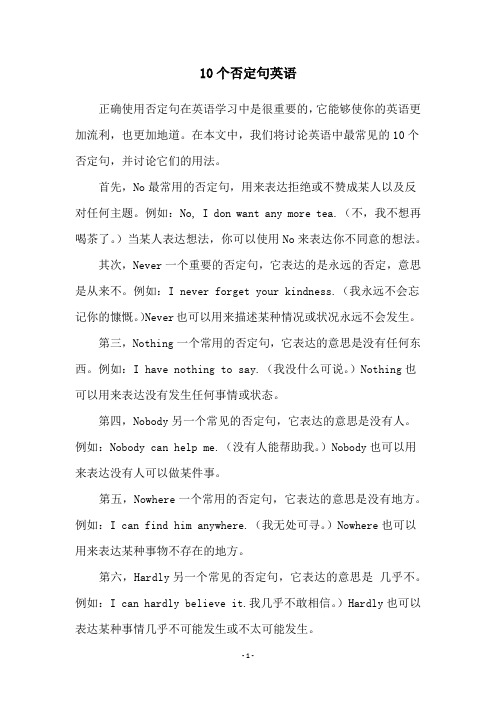
10个否定句英语正确使用否定句在英语学习中是很重要的,它能够使你的英语更加流利,也更加地道。
在本文中,我们将讨论英语中最常见的10个否定句,并讨论它们的用法。
首先,No最常用的否定句,用来表达拒绝或不赞成某人以及反对任何主题。
例如:No, I don want any more tea.(不,我不想再喝茶了。
)当某人表达想法,你可以使用No来表达你不同意的想法。
其次,Never一个重要的否定句,它表达的是永远的否定,意思是从来不。
例如:I never forget your kindness.(我永远不会忘记你的慷慨。
)Never也可以用来描述某种情况或状况永远不会发生。
第三,Nothing一个常用的否定句,它表达的意思是没有任何东西。
例如:I have nothing to say.(我没什么可说。
)Nothing也可以用来表达没有发生任何事情或状态。
第四,Nobody另一个常见的否定句,它表达的意思是没有人。
例如:Nobody can help me.(没有人能帮助我。
)Nobody也可以用来表达没有人可以做某件事。
第五,Nowhere一个常用的否定句,它表达的意思是没有地方。
例如:I can find him anywhere.(我无处可寻。
)Nowhere也可以用来表达某种事物不存在的地方。
第六,Hardly另一个常见的否定句,它表达的意思是几乎不。
例如:I can hardly believe it.我几乎不敢相信。
)Hardly也可以表达某种事情几乎不可能发生或不太可能发生。
第七,Nothing but一个常见的否定句,它表达的意思是除了其他一切,只有一件事发生。
例如:She has nothing but good intentions.(她只有善意的想法。
)Nothing but也可以用来表达仅有一件事情或一种情感发生。
第八,At no time另一个常见的否定句,它表达的意思是某件事永远不会发生。
英语否定句的基本类型
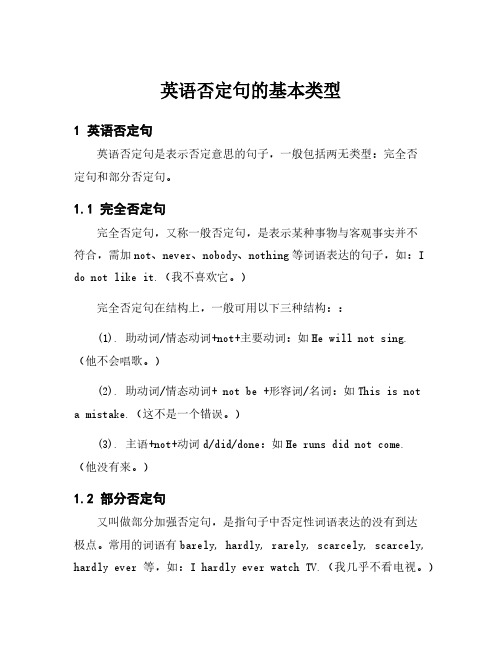
英语否定句的基本类型1 英语否定句英语否定句是表示否定意思的句子,一般包括两无类型:完全否定句和部分否定句。
1.1 完全否定句完全否定句,又称一般否定句,是表示某种事物与客观事实并不符合,需加not、never、nobody、nothing等词语表达的句子,如:I do not like it.(我不喜欢它。
)完全否定句在结构上,一般可用以下三种结构::(1). 助动词/情态动词+not+主要动词:如He will not sing.(他不会唱歌。
)(2). 助动词/情态动词+ not be +形容词/名词:如This is nota mistake.(这不是一个错误。
)(3). 主语+not+动词d/did/done:如He runs did not come.(他没有来。
)1.2 部分否定句又叫做部分加强否定句,是指句子中否定性词语表达的没有到达极点。
常用的词语有barely, hardly, rarely, scarcely, scarcely, hardly ever等,如:I hardly ever watch TV.(我几乎不看电视。
)部分否定句在结构上,也有三种:(1). 助动词/情态动词+hardly / scarcely/ rarely(almost不常用)+动词原形:如He can hardly speak English.(他几乎不会说英语。
)(2). 主语+hardly/scarcely/rarely(almost不常用)+动词过去式:如She rarely visited the park.(她很少去公园。
)(3). 主语+have/has+hardly/scarcely/rarely(almost不常用)+过去分词:如I have hardly taken the exam.(我几乎没参加过考试。
)以上就是英语中完全否定句和部分否定句的基本类型,当然还有很多否定句的表达方式,都是因人而异。
英语否定句翻译
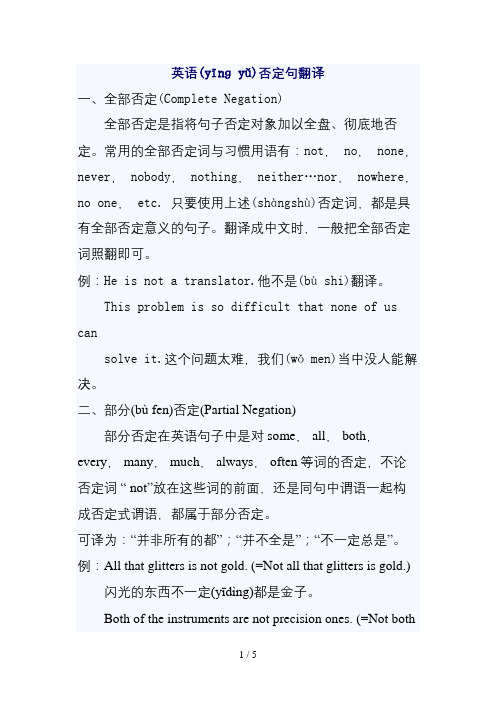
英语(yīnɡ yǔ)否定句翻译一、全部否定(Complete Negation)全部否定是指将句子否定对象加以全盘、彻底地否定。
常用的全部否定词与习惯用语有:not, no, none,never, nobody, nothing,neither…nor, nowhere,no one, etc. 只要使用上述(shàngshù)否定词,都是具有全部否定意义的句子。
翻译成中文时,一般把全部否定词照翻即可。
例:He is not a translator.他不是(bù shi)翻译。
This problem is so difficult that none of us cansolve it.这个问题太难,我们(wǒ men)当中没人能解决。
二、部分(bù fen)否定(Partial Negation)部分否定在英语句子中是对some, all, both,every, many, much, always, often等词的否定,不论否定词“ not”放在这些词的前面,还是同句中谓语一起构成否定式谓语,都属于部分否定。
可译为:“并非所有的都”;“并不全是”;“不一定总是”。
例:All that glitters is not gold. (=Not all that glitters is gold.) 闪光的东西不一定(yīdìng)都是金子。
Both of the instruments are not precision ones. (=Not bothof the instruments are precision ones.)这两台仪器(yíqì)并不都是精密仪器。
从以上两例可看出,not every=some, not both=one, not always=sometimes,not wholly=in some degree not together=somewhat.三、双重否定(Double Negation)双重否定是指两个否定词并用,否定同一个单词,或者一个否定词否定另一个否定词,其否定意义互相抵消得到肯定意义。
英语中必须掌握的八种否定形式
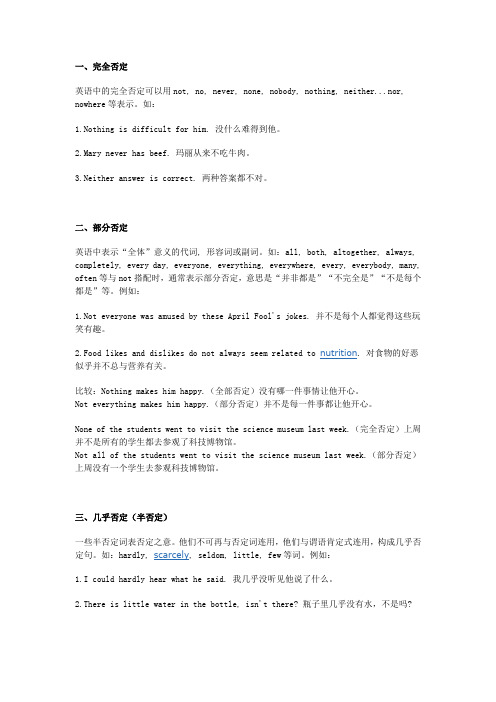
英语中的完全否定可以用not, no, never, none, nobody, nothing, neither...nor, nowhere等表示。
如:1.Nothing is difficult for him. 没什么难得到他。
2.Mary never has beef. 玛丽从来不吃牛肉。
3.Neither answer is correct. 两种答案都不对。
二、部分否定英语中表示“全体”意义的代词, 形容词或副词。
如:all, both, altogether, always, completely, every day, everyone, everything, everywhere, every, everybody, many, often等与not搭配时,通常表示部分否定,意思是“并非都是”“不完全是”“不是每个都是”等。
例如:1.Not everyone was amused by these April Fool's jokes. 并不是每个人都觉得这些玩笑有趣。
2.Food likes and dislikes do not always seem related to nutrition. 对食物的好恶似乎并不总与营养有关。
比较:Nothing makes him happy.(全部否定)没有哪一件事情让他开心。
Not everything makes him happy.(部分否定)并不是每一件事都让他开心。
None of the students went to visit the science museum last week.(完全否定)上周并不是所有的学生都去参观了科技博物馆。
Not all of the students went to visit the science museum last week.(部分否定)上周没有一个学生去参观科技博物馆。
否定句 英语 百科
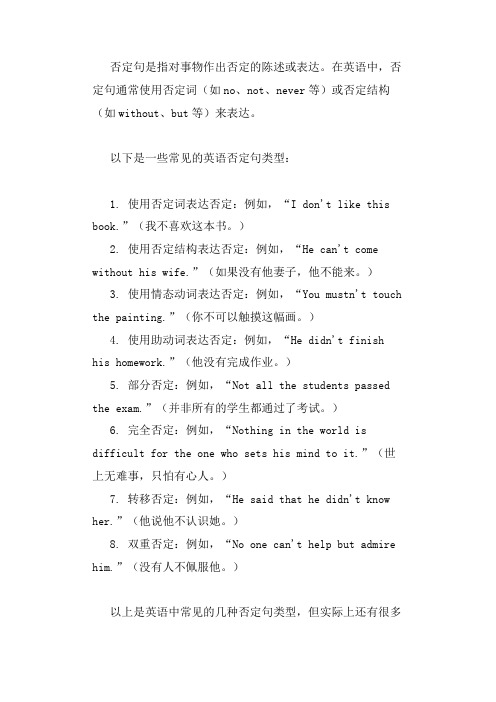
否定句是指对事物作出否定的陈述或表达。
在英语中,否定句通常使用否定词(如no、not、never等)或否定结构(如without、but等)来表达。
以下是一些常见的英语否定句类型:
1. 使用否定词表达否定:例如,“I don't like this book.”(我不喜欢这本书。
)
2. 使用否定结构表达否定:例如,“He can't come without his wife.”(如果没有他妻子,他不能来。
)
3. 使用情态动词表达否定:例如,“You mustn't touch the painting.”(你不可以触摸这幅画。
)
4. 使用助动词表达否定:例如,“He didn't finish his homework.”(他没有完成作业。
)
5. 部分否定:例如,“Not all the students passed the exam.”(并非所有的学生都通过了考试。
)
6. 完全否定:例如,“Nothing in the world is
diff icult for the one who sets his mind to it.”(世上无难事,只怕有心人。
)
7. 转移否定:例如,“He said that he didn't know her.”(他说他不认识她。
)
8. 双重否定:例如,“No one can't help but admire him.”(没有人不佩服他。
)
以上是英语中常见的几种否定句类型,但实际上还有很多
其他的表达方式。
在具体语境中,需要根据具体情况选择合适的表达方式。
- 1、下载文档前请自行甄别文档内容的完整性,平台不提供额外的编辑、内容补充、找答案等附加服务。
- 2、"仅部分预览"的文档,不可在线预览部分如存在完整性等问题,可反馈申请退款(可完整预览的文档不适用该条件!)。
- 3、如文档侵犯您的权益,请联系客服反馈,我们会尽快为您处理(人工客服工作时间:9:00-18:30)。
(7)否定词+否定意义的动词/名词/形容词/副词 英语中有许多词语虽没有被否定词修饰或不 含否定词缀,但它们的意义却完全可能是否定的, 这样的词和否定词连用时也会构成双重否定。 We don't doubt that he will succeed in carrying out the experiment. 我们相信他会做好这个实验。 There is no denying the fact that your action has affected her normal life. 不可否认,你的行为已经影响了她的正常生活。 Comrade Lei Feng was not reluctant to help others. 雷锋同志非常乐于助人。
否定句的翻译
英汉两种语言在表达方法上存在很大 差异,尤其在表达否定概念上,英语 在用词、语法和逻辑等方面与汉语都 有很大不同。有些英语否定句译成汉 语后却变成了肯定形式,而另一些肯 定句型译成汉语后又往往变成否定形 式。翻译时要灵活换,才能准确翻译。
部分否定
表示方法: 一、 all 的否定式:not all…(或:all…not)表示\"并非 都……\"、\"不是所有的都……\masters. (= All men cannot be masters.) 并非人人都能当头头。 Not all bamboo grows tall. 并非所有的竹子都会长很高。
(2)主语否定+状语否定
主语否定指主语常由no-word(比如no+名词、nobody、 none nothing、no one等,这些词被称之为绝对否定词)来担当, 或主语由not来否定。 In some countries no major business is carried on without eye contact, requiring face-to-face conversation. 在有些国家,一切公事都要面对面地进行,需要当面交谈。 There is no success without hard ships.
双重否定double negation
1. 强化肯定的双重否定句结构: (1)谓语否定+状语否定 在这种双重否定结构中,谓语否定主要指“never+ 实义动词”或“操作词+not+实义动词”;状语否定指 “介词+名词/动名词”,要么介词否定,要么名词或动 名词否定,而介词否定的形式多表现为一个词,即without。 例如: You cannot make egg rolls with out breaking eggs. 不打破鸡蛋,就无法做出蛋卷来。(即:有失才有得。) He will not do it for nothing?? 他不会无缘无故做这件事。(他做这件事定有企图。)
二、 both 的否定式:not…both (或:both… not) \"并非两 个……都……\" 例如: I don\'t want both the books. 我不是两本书都要。 Both (the) windows are not open. 两扇窗子并不都开着。
三、 every…的否定式:\"不是每……都……\" 例如:
全部否定
若要表示全部否定,则应用相应的表示全部否定的 否定词。 all → none (一个人也没有、没有任何东西), both → neither (两个都不), every → no, everyone → no one(nobody), everything → nothing 等。
Not every book is educative. (或:Every book is not educative.) 不是每本书都有教育意义的。 Not everyone likes this book. 并非人人都喜欢这本书。 This flower is not seen everywhere. 这花并不是随处可见的。 四、 always的否定式:\"并非总是(并非一直)……\" 例如: He is not always so sad. 他并不是一直都这样悲伤。
如要对上述的all, both, every, always, 以及entirely, altogether, completely, quite 和 all the time 等词作完全否定, 那就分别要用与之相对应的全否定词,如no, none, neither, no one, never, not (never)… at all 等。例如: All of them can do it.--- None of them can do it. Both are good.---Neither is good. Everybody likes it. ---Nobody likes it. He is always late. --- He is never late. We don't trust them entirely. --- We never trust them at all. He was here all the time. --- He was never here.
七、 not…and…的否定式,被否定的往往是and后面的那一部 分。 例如: He did not speak clearly and correctly. 他讲得清楚但不正确。 This film is not interesting and instructive. 这部电影有趣但无教育意义。 She cannot sing and dance. 她会唱歌但不会跳舞。 如果将and 换成or,not 对其后面的两部分就全盘否定了。 He did not speak clearly or correctly. 他讲的既不清楚也不正确。
8)主句否定+从句否定 In the neighborhood there is nobody who does not know me. 在这儿,我绝对是个名人。 I never read novels that don't appeal to me?? 我从不看不感兴趣的小说。 You cannot take the books away unless you get the special permission from the dean?? 除非你有系主任的特批,否则你不能把书 借走。
没有磨难,就没有胜利。(没有经历暴雨,那有彩虹。) Not a student has access to the library without showing his student card 不出示学生证,就进入不了图书馆。
(3)主语否定+谓语否定 Nobody does not believe in him. 人人相信他。(无人不信他。) Not many students will not succeed in passing the exam. 大多数同学会通过考试。
2)否定含义的词语,如wonder(想知道、不知道) don't know/can't tell+否定宾语从句 I worked and worked, and I didn't know how much I had not done. 我日以继日地工作,不知道干了多少活。 I could not tell what was not my amazement at the sight of the magnificent Mount Huang?? 我说不出,有什么能比我看到那雄伟壮观的黄山时,更为 惊喜的事了。 除了上面提到的这两种情况,下列句子中的强调双重否定 也经常见到: In the old society, our family had no food, no clothes, no nothing. 在旧社会里我们家无衣无食,一无所有。 He is a mere nobody that nobody knows. 他仅仅是个小人物,没有人认识他。
翻译练习
1) I don't know all of them. 我并不全认识他们。 2) I don't like both of the books. 这两本书我并不都喜欢。 3) Not every student goes to the farm on Sundays. 并非每个学生星期天都去农场。 4) Not everyone in our class likes football. 在我们班并非每个人都喜欢足球。
(4)谓语否定+宾语否定 I do not have nothing to say.
我有话要说。 We can't afford not to believe it (the missile attack). 我们不得不相信这(导弹袭击)是真的。
(5)主语否定+宾语否定 No one has nothing to contribute to society?? 人人对社会都有贡献。 Nobody has no access to the sporting facilities?? 人人都可以使用这些体育器材。 (6)主语否定+补语否定 补语覆盖面很广,包括名词、介词、形容词、副词、 代词、分词以及不定式等等,这些词本身可以是否定形式 (比如代词nothing、nobody等),也可以被否定词修饰 (比如not+补语),也可指那些含有否定词缀的形式 (比如形容词、分词的否定词缀等)。 Nothing is nothing at all?? 没有一件事是微不足道的。(凡事都有重要性。) No smoking is harmless?? 吸烟有害健康。 No place is left unexploited?? 到处都已被开发。
